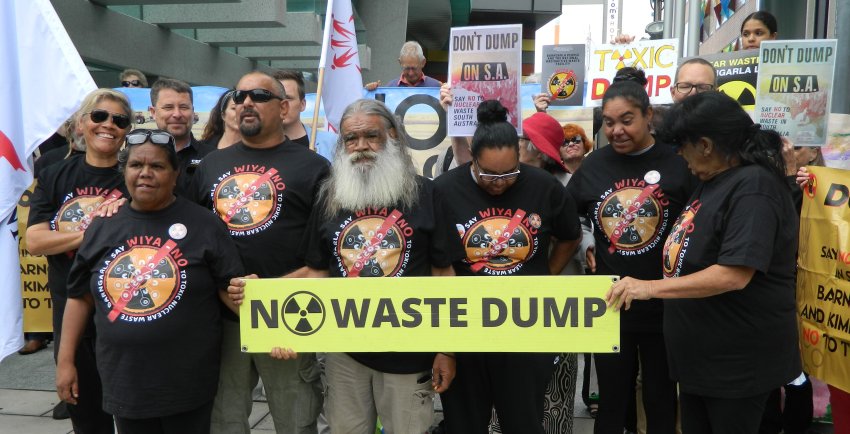
A Federal Court judgment on July 18 has brought apparent victory to Traditional Owners, blocking the construction by the federal government of a national radioactive waste dump near Kimba on South Australia’s Eyre Peninsula.
Federal Resources Minister Madeline King could still bring an appeal against the court’s decision. But such a move would worsen a sharp rift within the Labor Party. Leaders of the SA Labor government have criticised the project, even as their federal counterparts have allowed plans for it to go ahead.
The $325 million Kimba project is now widely believed to be dead.
Jason Bilney, Chair of the Barngarla Determination Aboriginal Corporation that has led a three-year fight to stop the dump, described the judge’s finding as a “victory for all First Nations people”.
Bilney added that the money — estimated at $13 million — that the federal government spent trying to defeat the Barngarla people in court could have been “better spent for the rest of Australia, everyday Australians and the community”.
Federal authorities have been pursuing the goal of a national radioactive waste dump since the first relevant legislation was adopted under John Howard’s Coalition in 2007. It allowed the government to impose a dump on Traditional Owners, locking them out of the decision-making process.
Julia Gillard’s Labor government made superficial amendments in 2012, but the renamed National Radioactive Waste Management Act still did not require Traditional Owners to be consulted, or for them to give consent.
Under Tony Abbott’s Coalition, an attempt was made in 2014 to place a waste dump on freehold Aboriginal land at Muckaty Station in the Northern Territory. This was abandoned after First Nations opposition.
The search then turned to SA, where an attempt to locate a dump site in the Flinders Ranges fell through after local residents rejected it in a ballot.
A 2019 postal ballot of ratepayers in the Kimba council area — almost all of whom were not First Nations — then returned a positive verdict. “Sweeteners” for residents included the promise of as much as $30 million for local projects, and of some 45 jobs at the prospective dump.
Faced with the prospect of a radioactive waste dump on their land, the Barngarla began organising.
Support for their cause grew steadily, developing into a broad coalition that included not just First Nations rights activists and anti-nuclear campaigners, but Kimba farmers. Among the supporters were prominent members of SA Labor.
Unlike their federal counterparts, SA Labor has a position that calls for First Nations people to have a right to veto the dumping of radioactive waste on their traditional lands.
Deputy Labor leader (and now Deputy Premier) Susan Close described the procedures that were to lead to the selection of the Kimba site as “appalling” and “a dreadful process from start to finish” to which SA Labor was “utterly opposed”.
Nevertheless, Scott Morrison formally selected the Kimba district as the site for its dump in early 2020. The Coalition bought a 211-hectare swathe of the property “Napandee”, west of Kimba, for the dump facility in 2021.
Although Napandee and Kimba are part of Barngarla lands, the fact that most Barngarla people do not live in the Kimba district meant they had been denied a vote in the 2019 ballot.
This led them to commission an independent, professionally conducted ballot of their own people. Of those who voted, not a single one supported the waste dump.
“It’s a simple truth,” Bilney later said, “that had we ... been included in the Kimba community ballot rather than unfairly denied the right to vote, then the community ballot would never have returned a yes vote.”
The Barngarla began a legal challenge in 2021. During repeated hearings, supporters demonstrated outside the courtroom, often alongside Barngarla people who had made the long trip from Port Augusta and beyond. But successes were few and, as this year unfolded, the feeling among opponents of the dump that options in court were running out was palpable.
For many Barngarla and their supporters who were in the courtroom on July 18, Justice Natalie Charlesworth’s ruling was a thrilling surprise.
Charlesworth agreed with the argument, put forward by lawyers for the Barngarla, that when Coalition Resources Minister Keith Pitt approved the Kimba dump in 2020 he had “prejudged” the issue, and that his decision “was affected by apprehended bias”. The whole of the decision Pitt had made, the judge determined, should be set aside.
Embarrassingly for the former Coalition and the Anthony Albanese government, Charlesworth’s finding was consistent with the United Nations Declaration on the Rights of Indigenous Peoples, which Australia claims to support but has failed to enact.
The declaration states that “no storage or disposal of hazardous materials shall take place in the lands or territories of indigenous peoples without their free, prior and informed consent.”
Friends of the Earth National Anti-Nuclear Campaigner Jim Green summed up the thoughts of many opponents of the dump plan: “Prime Minister Anthony Albanese needs to take control and declare that the rights of the Barngarla Traditional Owners will be respected, today’s Federal Court decision will not be challenged, and the government will now abandon the plan to impose a nuclear waste dump on Barngarla country.
“Federal Labor should adopt SA Labor’s policy of giving traditional owners a right of veto over proposed nuclear waste dump sites.”
Barngarla spokesperson Bilney was more expansive: “This result today is about truth-telling. The Barngarla fought for 21 years for Native Title rights over our lands, including Kimba, and we weren’t going to stop fighting.
“If you have a voice and want it to be heard, never give up. Continue to be loud. Don’t rely on others to speak for you. Truth telling is what led us today. We are proud.”